
AI Screening: A Comprehensive Guide for Recruiters
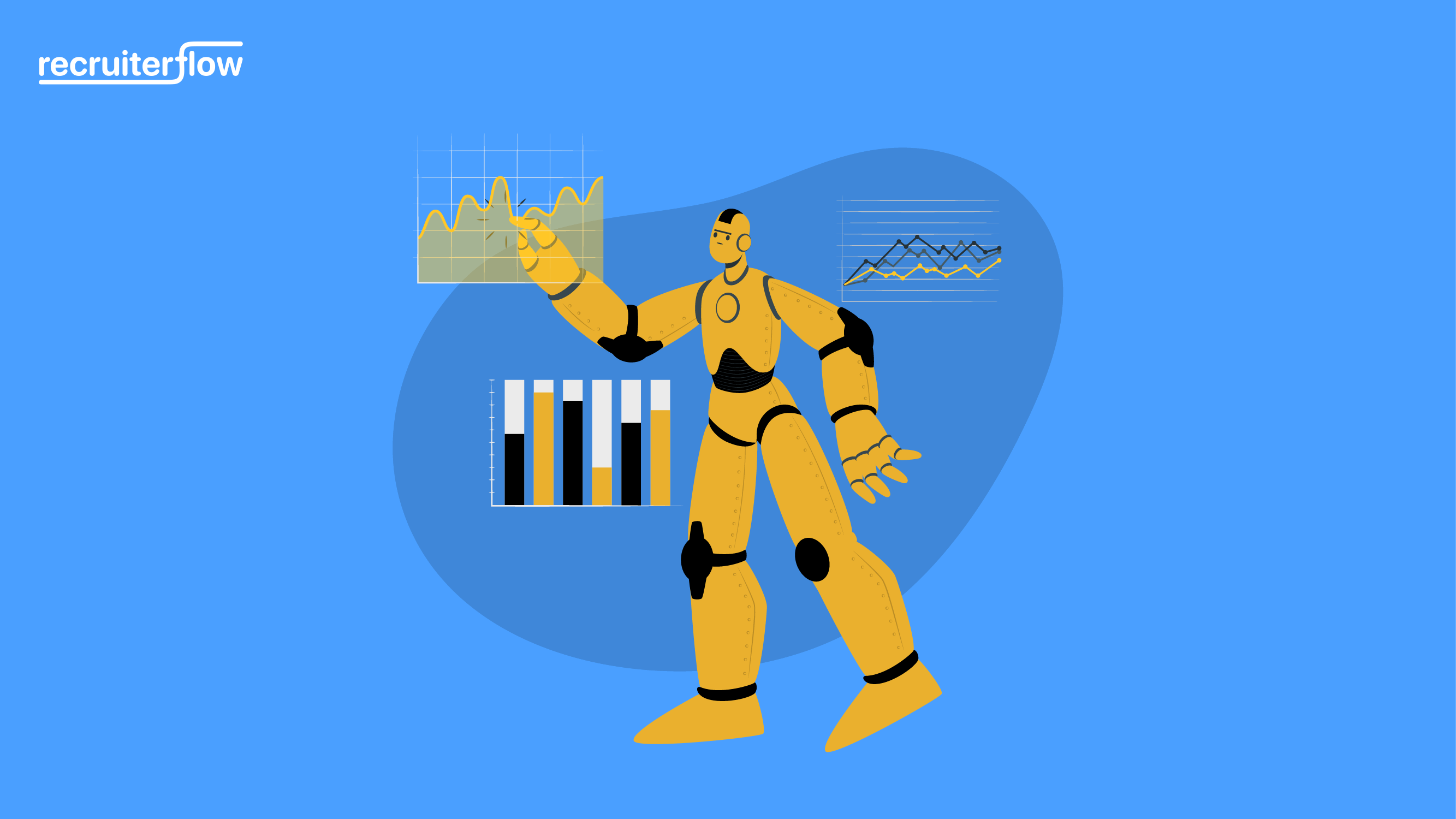
AI screening is the talk of the town for a good reason.
From speeding up how you review applicants to spotting early red flags, the potential is huge.
But what exactly is AI screening, and how does it work? What makes it so valuable for recruiters? Which AI screening tools are leading the charge in this space?
This guide on AI screening will help you understand the definition, workings, and use cases. We will also cover the AI screening tools that can help you get started, along with a few tips and tricks to make your AI screening process highly efficient.
Without further ado, let’s begin.
What is AI Screening?
AI screening (or AI candidate screening) is the process of evaluating candidates with AI-powered tools.
It helps evaluate candidates who are at different stages, such as resume screening, skill tests, video interviews, and behavioral analysis.
Candidates are then assessed using multiple inputs, such as resumes, test scores, and recorded interviews.
Here are some use cases of AI screening:
- Automatic resume parsing and analyzing resumes based on your criteria.
- Chatbots for initial screenings via Q&A.
- Analyzing recorded interview responses for tone, confidence, and culture fit.
- Evaluating candidates based on skill tests or project submissions.
AI resume screening (or AI CV screening) uses AI to assess candidates solely with resumes. AI resume screening is a subset of the AI screening process.
Resume screening using AI filters and ranks candidates based on the information in their resumes.
AI screening is one of the stages of an Applicant Tracking System (ATS), which screens from sourcing to onboarding.
One real-world example of AI screening is an AI-powered ATS like Recruiterflow’s AI screening capabilities. The AI screening tools help you:
- Filter and rank the best candidates
- Craft screening questions
- Generate concise candidate summaries
- Pull job insights and candidate analytics
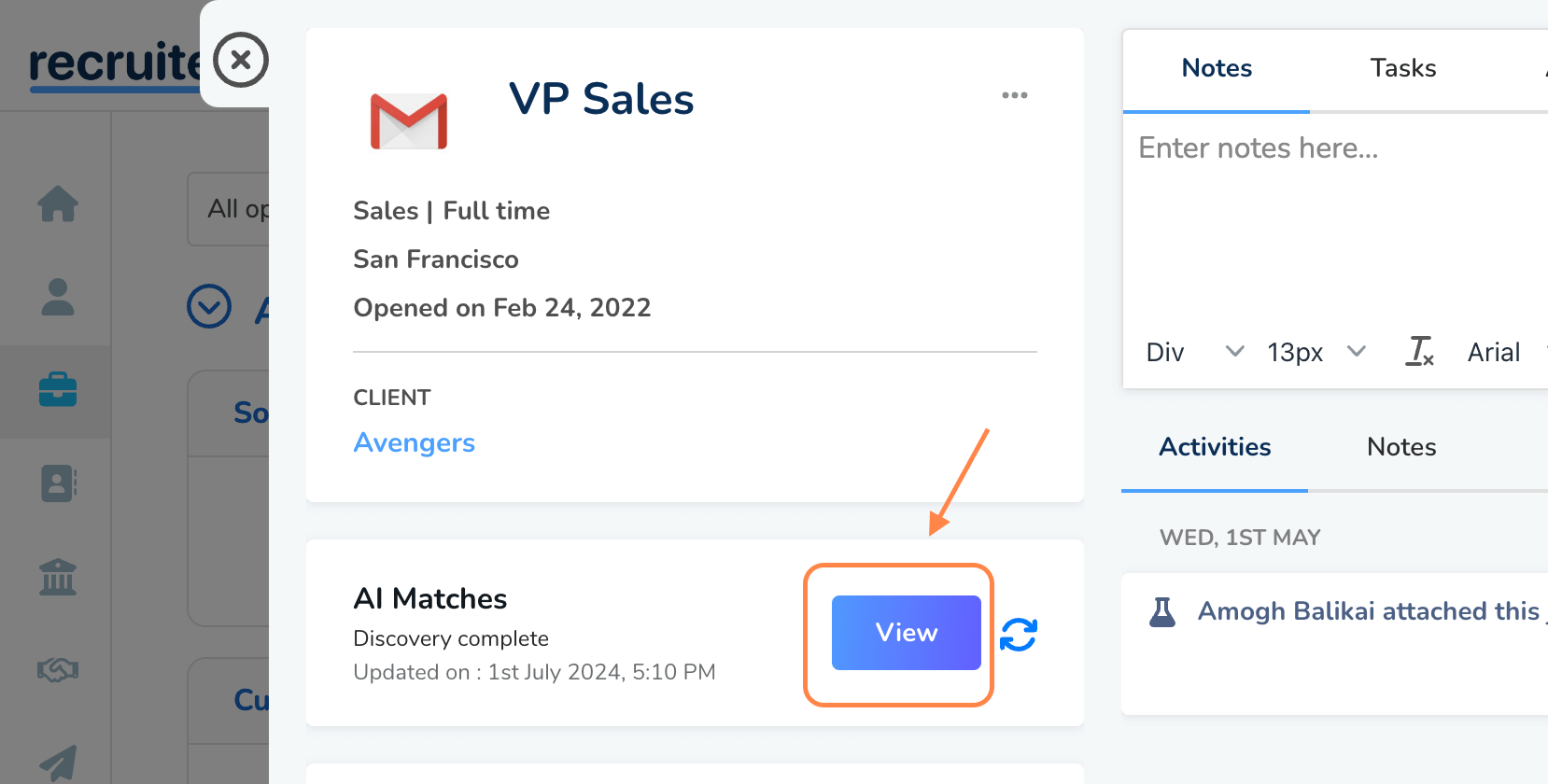
The days of just 1-dimensional keyword matching are long gone. Today, AI screening uses NLP and LLMs that comprehend the essence of resumes. Tools such as GPT-4 can assess keywords and the nuances of a candidate’s background, skills, etc.
Relevant read: AI Recruiting: A Complete Guide
Benefits of AI Screening for Recruiters
So, what exactly are the benefits of AI screening? Let’s break it down.
1. Saves Time and Boosts Efficiency
43% of recruiters say saving time is the main reason they use AI in hiring. AI screening tools save you hours by scanning and ranking resumes in minutes.
2. Improves Candidate Quality
It doesn’t just screen faster; it screens smarter. AI shortlists only the right candidates based on skills and experience.
According to a study by the Harvard Business Review, Companies that use AI in their hiring process are 46% more likely to achieve successful hires.
3. Reduces Unconscious Bias
AI screening gives candidates a fair chance in that it focuses more on skills and qualifications rather than demographic factors.
AI screening can effectively reduce bias by up to 40%. Resume screening tools like Recruiterflow and Zoho Recruit help you use AI to anonymize resumes and ensure fairer evaluations.
4. Enhances Candidate Experience
AI screening makes the candidate experience better by making hiring faster, cutting down bias, and ensuring fair assessments.
For instance, companies that use AI chatbots, like IBM, create a more positive experience by engaging with candidates and providing status updates.
5. Provides Data-Driven Insights
AI does more than just look at candidates; it also provides useful information about your hiring process. It can show where there are delays and help predict which candidates will succeed.
Platforms like Eightfold.ai and Entelo for example help you use predictive analytics to recommend top candidates and forecast hiring outcomes.
You can also check out our comprehensive guide on candidate matching
6. Scales with Your Hiring Needs
AI can handle hiring for one role or a hundred. It is particularly helpful in situations with many applicants where manual reviews are not practical.
Retail giant Walmart, for instance, uses AI to screen thousands of seasonal hires and make sure they meet the company’s standards without overwhelming recruiters.
7. Cost-Effective Hiring
Hiring the wrong candidate can cost a lot. Think about the training expenses and the need to hire again. AI screening helps you get it right the first time, without having to lose any money in the long run.
The average cost of a bad hire is 30% of the employee’s first-year earnings, according to the U.S. Department of Labor. AI screening minimizes this risk by identifying the best-fit candidates.
Cut admin work, increase placements and let your recruiters focus on conversations, not spreadsheets. Discover how with Recruiterflow AI.
How the AI Screening Process Works
Let’s see how it all works. The process of AI resume screening generally involves the following steps:
1. Resume Parsing
It starts with resume parsing when AI analyzes resumes to identify critical information such as skills and experience. No small feat as resumes can come in many forms and layouts.
In this case, AI reads and interprets the text, even if it’s buried in tables, bullet points, or unconventional layouts.
2. Keyword Matching & Contextual Analysis
Once the data is extracted, AI compares it to the job description using keyword matching. But it is no longer simply about finding exact matches; today’s tools recognize synonyms, keyword clusters, related terms, and even context.
For example, if the job description mentions “project management,” the AI might also recognize “team leadership” or “agile methodologies” as relevant skills.
This is when things get interesting. AI now analyzes context to understand the nuances of a candidate’s experience too.
For example, you can now tell the difference between someone who “managed a team of 10” and someone who “led a cross-functional project with 50 stakeholders.”
3. Scoring and Ranking
With the results obtained from analyzing the data, AI then gives each candidate a score based on how well they match the job requirements. This helps you quickly identify the top candidates.
For example, a candidate with 5+ years of experience scores higher than someone with only 2.
4. Predictive Analytics (Optional)
Some AI recruiting tools take it up a notch higher by factoring in analytical components that predict the performance of the candidate in a particular job. This is done based on previous experience and previous hires’ trends for the particular organization.
For example, if candidates with certain skills or backgrounds have performed well in a role, the AI will prioritize similar profiles.
5. Continuous Learning
AI screening tools aren’t static, they learn and improve over time. By analyzing feedback and outcomes, they refine their algorithms to make better predictions and recommendations.
Recruiterflow, for example, uses deep learning to continuously improve its candidate-matching capabilities.
A Practical Example of How AI Screening Works
You’ll now see how to use AI for resume screening with Recruiterflow’s AI Matching System. And here’s the scenario: find the perfect candidate for a Software Engineer role.
Say a recruitment agency like yours is tasked with hiring a Senior Software Engineer for a client. The agency uses Recruiterflow’s AI Matching System to identify the best candidates from their existing database.
Here’s what it will look like:
1. Job Creation and AI Matching
The recruiter creates a job posting for the Senior Software Engineer role with details like the required skills (e.g., Python, AWS, Amazon ECS, React) and experience (5+ years).
They then open a job, navigate to the AI Matches card, and click ‘Generate’.
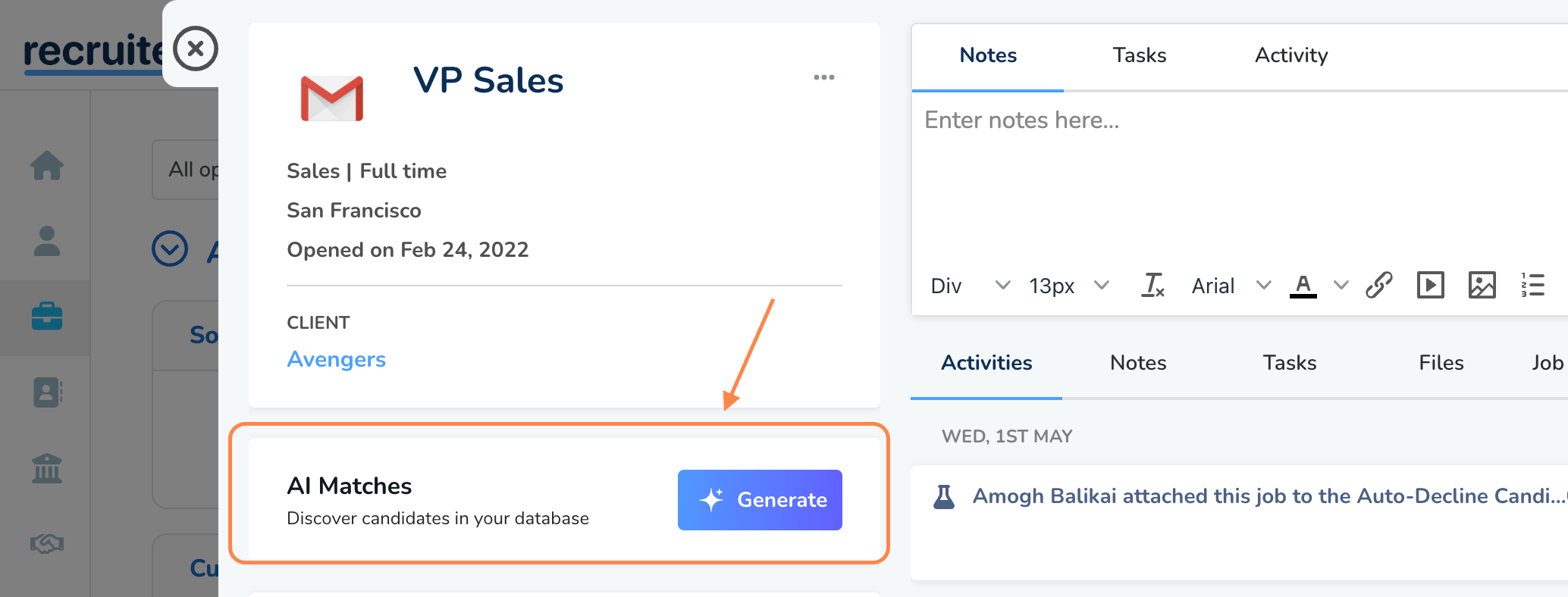
The AI system then:
- Analyzes the job details
- Scans the agency’s database of candidates
- Ranks them based on relevance to the role.
2. Candidate Ranking
Within minutes, the AI generates a list of candidates, ranked from most to least relevant. For example:
- Candidate A: 10 years of experience, proficient in Python and AWS, currently a Senior Engineer.
- Candidate B: 7 years of experience, strong React skills, but lacks AWS expertise.
- Candidate C: 5 years of experience, skilled in Python and React, but no prior AWS experience.
3. Refining the List with Filters
The recruiter uses pre-built filters to narrow down the list:
- Has been in touch lately: Filters out candidates who haven’t engaged with the agency in the last 9 months.
- Near Job Location: Ensures candidates are within a 25km radius of the job location.
- Not in Active Job: Excludes candidates already placed in other active roles.
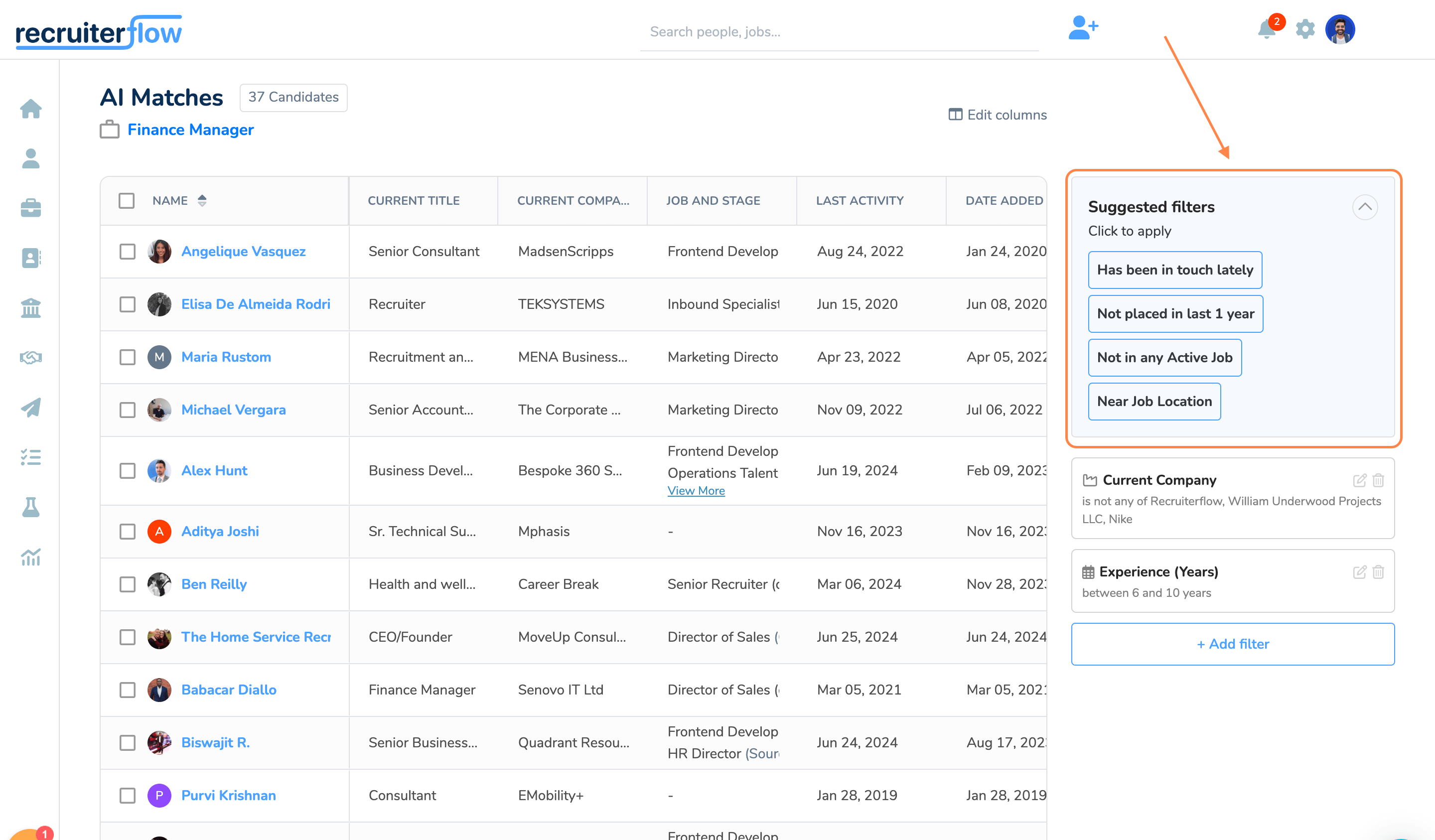
4. Reviewing and Selecting Candidates
The refined list now highlights Candidate A as the top match. The recruiter reviews their profile, which includes a detailed work history, skills, and past interactions with the agency. They click ‘Add to Job’ to shortlist the candidate for the next stage.
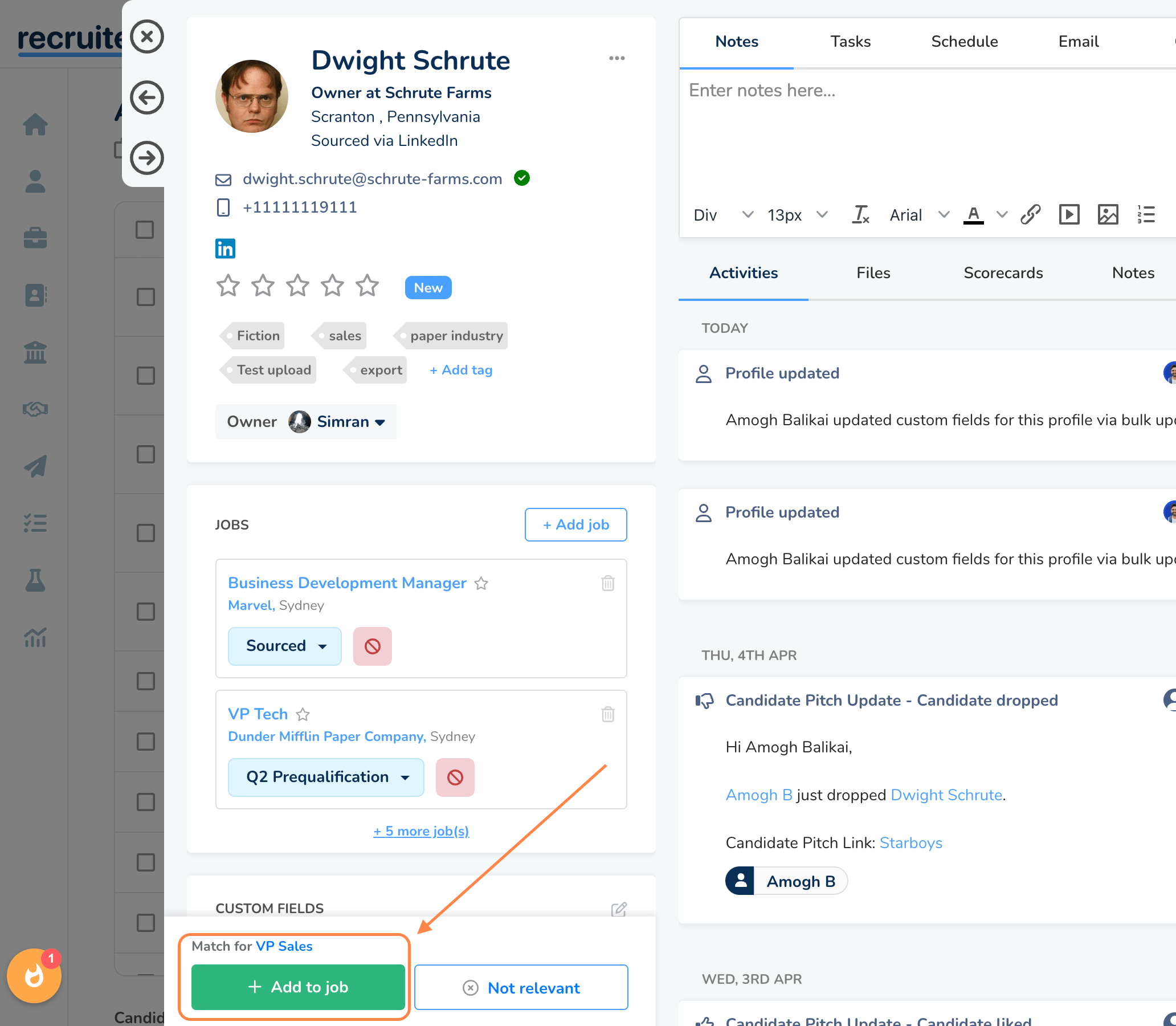
6. Feedback for Algorithm Improvement
If the recruiter finds a candidate irrelevant (e.g., Candidate C), they click ‘Less experience’ and provide feedback (e.g., ‘Candidate should have at least “5” Year(s) of experience’). This helps the AI improve future matches.
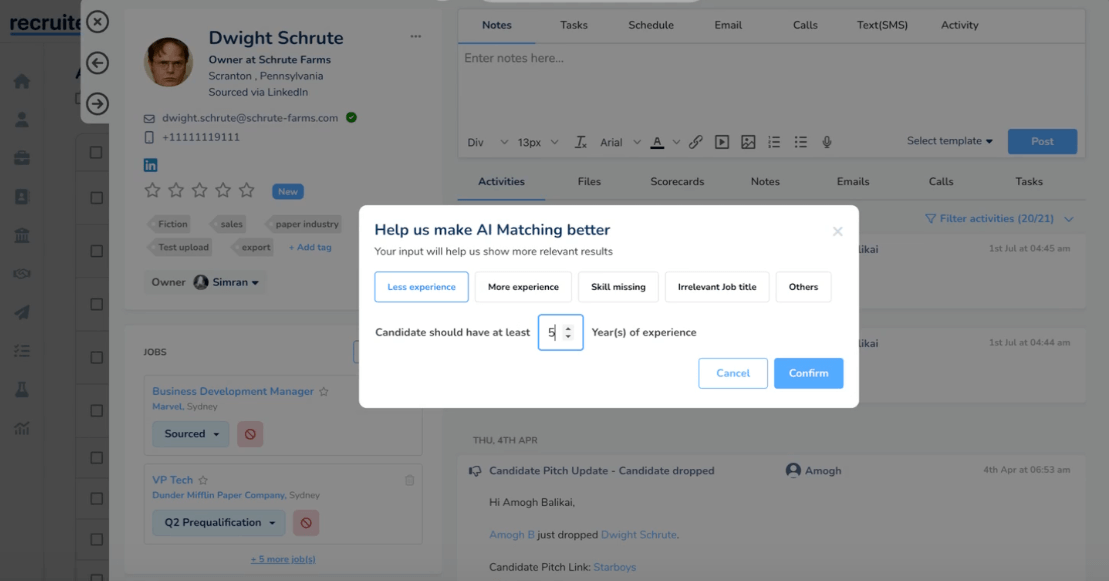
Let’s now look at the best AI candidate screening solutions for the job.
Top AI Screening Tools for Recruiters
As AI becomes more prominent across the recruiting process, here are some tools you must check out that are reshaping the hiring process:
1. Recruiterflow
Recruiterflow is an all-in-one recruitment platform that combines AI-powered screening with robust candidate relationship management (CRM) and applicant tracking system (ATS) functionalities.
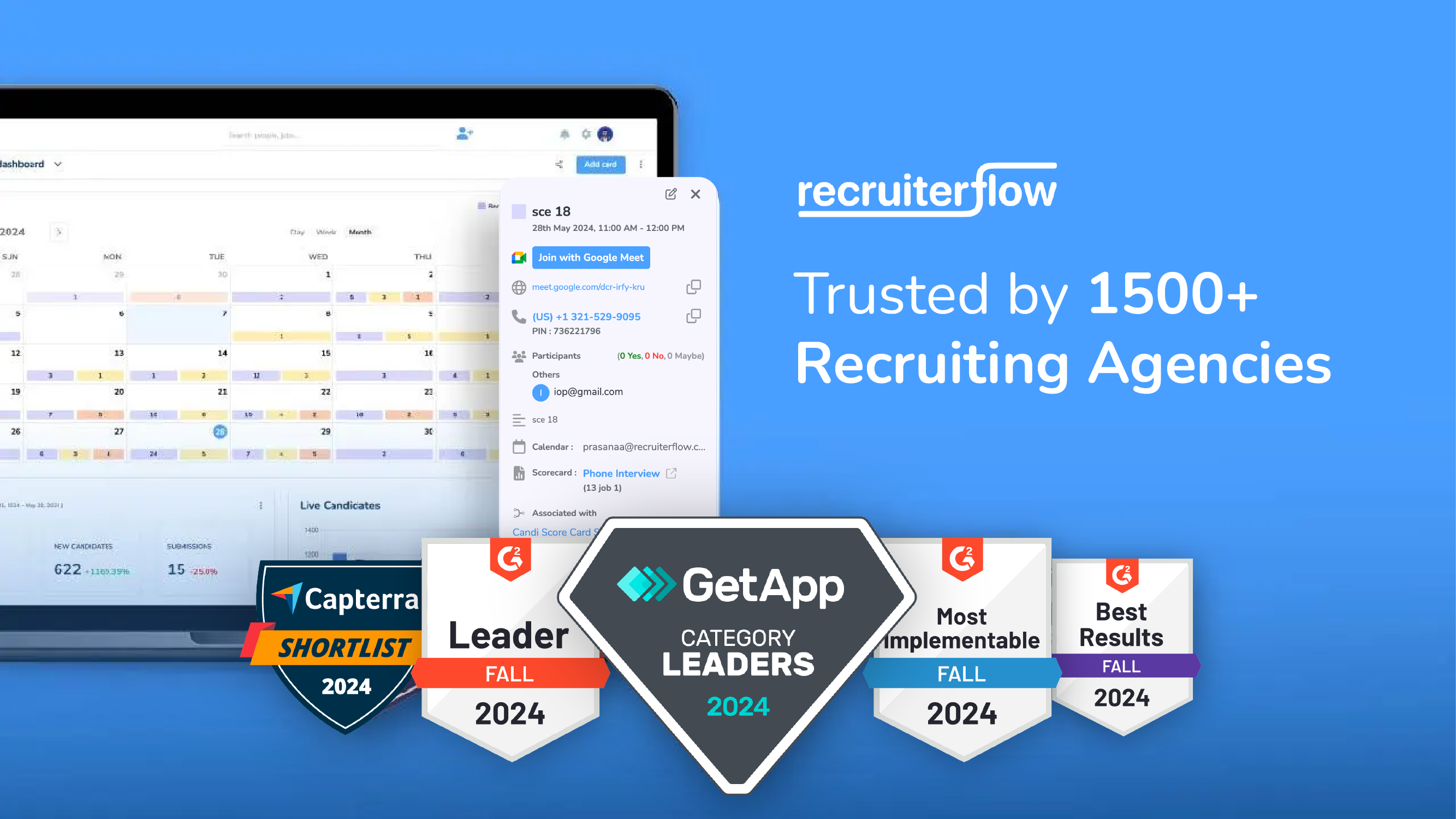
Key Features:
- AI Resume Parsing automatically extracts and organizes candidate data from resumes.
- Intelligent Candidate Matching that uses advanced algorithms to match candidates with job requirements.
- Automated Workflows that streamline repetitive tasks like email sequencing, interview scheduling, and candidate follow-ups.
- Diversity and Inclusion Tools for helping you reduce bias with anonymizing resumes.
- Real-time analytics that provides actionable insights like time-to-hire, candidate engagement, and pipeline efficiency.
Recruiterflow is also praised for its ability to reduce time-to-hire by 50% and improve candidate quality through its AI-driven matching and screening capabilities.
Pricing:
Starts at $119 per user per month. It’s an ideal solution for small to medium businesses as well as large enterprises.

2. HireVue
HireVue is a powerhouse in AI screening, focusing on video interviews and AI-driven assessments to evaluate candidates.
It’s particularly popular for its ability to analyze verbal and non-verbal cues during interviews, so recruiters can glean deeper insights into a candidate’s suitability.
Key Features:
- AI-powered video interviews with speech-to-text transcription.
- Predictive analytics to forecast candidate success.
- Bias reduction through standardized questions and evaluations.
Pricing:
Custom pricing is based on hiring volume, typically starting at $25,000/year.
3. Eightfold.ai
Eightfold.ai uses deep learning to match candidates with roles based on skills, experience, and career trajectories. It’s a favorite for companies looking to build diverse and inclusive teams.
Key Features:
- Skills-based matching using AI algorithms.
- Internal mobility tools to identify talent within the organization.
- Diversity and inclusion analytics to reduce bias.
Pricing:
Enterprise pricing, starting at $50,000/year.
4. Leoforce
Leoforce is an AI-powered talent engagement platform that combines candidate sourcing, screening, and relationship management into one seamless solution. It’s ideal for recruiters looking to build long-term relationships with candidates while automating repetitive tasks.
Key Features:
- AI-driven candidate matching and resume parsing.
- Advanced CRM functionalities for nurturing passive candidates.
- Integration with popular ATS platforms and job boards.
Pricing:
Custom pricing based on hiring volume and feature requirements.
5. Textio
Textio focuses on optimizing job descriptions to attract diverse candidates. Its AI analyzes language patterns to eliminate biased or exclusionary wording and makes sure your job posts resonate with a wider audience.
Key Features:
- Real-time language suggestions for inclusive job descriptions.
- Predictive analytics to gauge job post-performance.
- Integration with ATS platforms like Workday and LinkedIn.
Pricing:
Starts at $6,257 for a 6-month subscription.
6. Skillate
Skillate is an AI-driven recruitment platform that automates resume screening and candidate matching. It’s known for its ability to process large volumes of applications quickly and accurately.
Key Features:
- AI-powered resume parsing and candidate ranking.
- Chatbot for pre-screening and candidate engagement.
- Integration with ATS platforms like Workday and SmartRecruiters.
Pricing:
Custom pricing based on hiring volume.
7. Humanly
Humanly is a conversational AI platform that handles candidate screening, scheduling, and follow-ups. It’s perfect for high-volume recruitment, where efficiency is key.
Key Features:
- AI co-pilot for candidate screening and interview scheduling.
- Real-time transcription and note-taking during interviews.
- Advanced analytics to improve candidate experience.
Pricing:
Custom pricing is available upon request.
8. Paradox
Paradox’s AI assistant, Olivia, is ideal for high-volume hiring as it automates candidate engagement and scheduling. It’s particularly effective in industries like retail and hospitality.
Key Features:
- AI chatbot for candidate screening and interview scheduling.
- Multi-channel engagement (SMS, WhatsApp, Facebook Messenger).
- Integration with ATS platforms and HR systems.
Pricing:
Custom pricing, typically starting at $30,000/year.
9. HireEZ (formerly Hiretual)
HireEZ is an AI-powered talent intelligence platform that helps recruiters source and screen candidates from a database of over 800 million profiles.
Key Features:
- AI-driven candidate matching and sourcing.
- Diversity and inclusion analytics.
- Integration with ATS platforms like Greenhouse and Lever.
Pricing:
Custom pricing based on hiring needs.
10. Fetcher
Fetcher specializes in AI-powered candidate sourcing and outreach. It’s ideal for recruiters looking to automate the initial stages of candidate engagement.
Key Features:
- AI-driven candidate sourcing and personalized outreach.
- Pipeline analytics and diversity sourcing tools.
- Integration with ATS platforms and email providers.
Pricing:
Starts at $149/user/month.
Ready to go all in with AI? Be sure to check out our guides on AI recruiting tools and candidate sourcing tools for even more ways to optimize your hiring process.
Final thoughts
Although AI screening helps you save time, it’s really about making better, fairer, and more efficient hiring decisions.
Ready to take the plunge? Here’s how to get started:
- Evaluate Your Needs: Identify the pain points in your recruitment process. Are you struggling with high volumes of resumes? Bias in hiring? Slow time-to-fill?
- Choose the Right AI Screening Tool: Based on your needs, explore tools like Recruiterflow or HireVue. Many platforms offer free trials, so take them for a spin.
- Train Your Team: Ensure your recruitment team is comfortable using AI tools. Most platforms offer onboarding and training resources.
- Measure Success: Track key metrics like time-to-hire, candidate quality, and diversity rates to see the impact of AI screening on your process.
Also, check out this list of the best AI sourcing tools to supercharge your candidate sourcing.
Discover How Recruiterflow Can Transform Your Recruiting
Recruiterflow isn’t just an automated resume screening software using AI, it’s your all-in-one partner for better hiring. Here’s why recruiters are making the switch:
- AI-Powered Screening: Automatically parse resumes, match candidates to roles, and rank them based on skills and experience.
- Scalable and Customizable: Whether you’re a small agency or a large enterprise, Recruiterflow adapts to your unique needs.
- Automation: From interview scheduling to candidate follow-ups, Recruiterflow handles the repetitive tasks so you can focus on building relationships.
- Analytics: Track key metrics like time-to-hire, candidate engagement, and pipeline performance to make smarter decisions.
Don’t just take our word for it, here’s what Michale S., an SMB Founder, said about Recruiterflow on G2Crowd:
“The new AI capabilities are amazing, particularly the CANDIDATE SUMMARY feature. Its ability to read resumes and generate candidate summaries has saved me countless hours. Additionally, it creates interview questions based on the job description, enabling us to conduct more focused interviews.”
Ready to See It in Action? Take the First Step Today
Recruitment
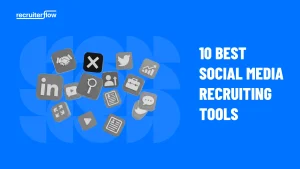

Pragadeesh Natarajan